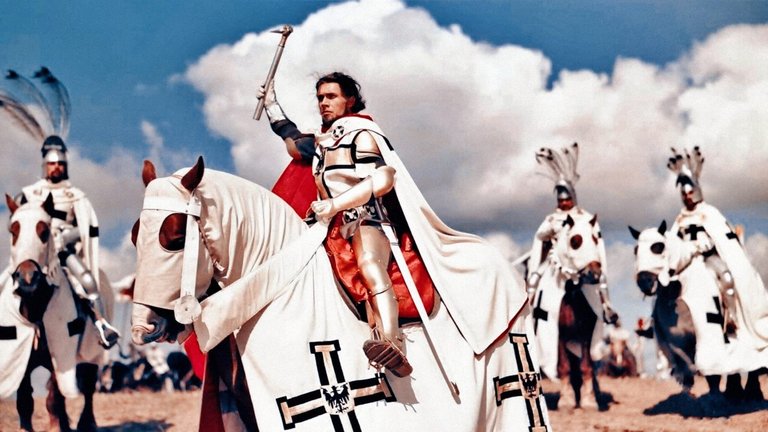
Most casual cinephiles often link Polish cinema with the serious, bleak, and rather unattractive dramas crafted by renowned directors such as Andrzej Wajda and Krzysztof Kieślowski. However, the reality of Polish cinemagoers mirrors that of audiences worldwide; they too yearn for entertainment akin to Hollywood's offerings. Thus, it comes as no surprise that the most popular films in the history of Polish cinema—at least in terms of ticket sales—is the 1960 historical epic Crusaders, known in English-speaking countries as Knights of the Teutonic Order.
The film is adapted from the 1900 novel by Henryk Sienkiewicz, a Nobel Prize-winning author celebrated for his historical fiction, particularly Quo Vadis. Sienkiewicz's storytelling prowess is evident in his ability to weave historical narratives with personal drama, a quality that translates effectively onto the screen.
Knights of the Teutonic Order opens with a prologue set near the small village of Grunwald on July 15, 1410, a date that would soon resonate in history due to the monumental battle that took place there. The plot then shifts back several years to explore the actions of the Teutonic Order—also known as the Knights of the Cross—who were primarily German warrior monks. Under the guise of eradicating paganism and heresy, they had conquered much of the Baltic region. The film introduces Jurand of Spichów (played by Andrzej Szalawski), a Polish nobleman engaged in a guerrilla campaign against these invaders after they attack his border castle. In parallel, we meet Zbyszko of Bogdaniec (played by Mieczysław Kalenik), a young and impoverished knight who falls in love with Jurand’s beautiful daughter, Danusia (played by Grażyna Staniszewska). Their romance becomes entangled with conflict when Danusia is treacherously abducted by Siegfried de Löwe (played by Henryk Borowski), a ruthless knight seeking to manipulate her father into submission. As tensions escalate, King Władysław II Jagiełło (played by Emil Karewicz) begins to build an alliance between Poland, Lithuania and other countries to confront the impending threat of Teutonic Knights, setting the stage for a clash that would shape Eastern Europe’s future.
In terms of production values, Knights of the Teutonic Order exhibits many characteristics typical of Hollywood's grand historical epics from that era, such as Spartacus or El Cid. The film boasts vibrant colour cinematography and expansive vistas captured through widescreen format, alongside thousands of extras contributing to its epic scale. With an impressive runtime approaching three hours, it immerses viewers in its richly detailed world.
Director Aleksander Ford enjoyed considerable financial backing from the Polish Communist government due to his affiliation with the ruling Polish United Workers’ Party. This support allowed him to create a film that aligned closely with official ideology and offered a reinterpretation of Polish history through the lens of World War II traumas stemming from German occupation. In many respects, Knights of the Teutonic Order can be viewed as a spiritual successor to Sergei Eisenstein's Alexander Nevsky. Both films utilise significant medieval battles as allegories for contemporary struggles, suggesting that for Slavs and Eastern Europeans in general, threats predominantly arise from the west powers rather than from the east. The coalition formed by Jagiełło before battle can even be interpreted as a medieval analogue to the Warsaw Pact—uniting nations of different ethnicities and religions against a common enemy.
However, audiences outside Poland in 1960 may not have been particularly concerned with this political subtext. Instead, they likely sought an engaging blend of historical reconstruction and fictional melodrama. Ford largely delivers on this expectation with elements such as romance, thrilling action sequences, impressive production design and costumes, along with moments of levity provided by Zbyszko’s uncle and mentor Maćko (played by Aleksander Fogiel). The film even includes a very brief scene featuring nudity through Urszula Modrzyńska’s portrayal of Jagienka, Zbyszko’s childhood friend and Danusia’s romantic rival.
The depiction of the actual Battle of Grunwald is handled competently; however, it may prove confusing for viewers unfamiliar with medieval military tactics. The climactic battle sequence is visually striking yet lacks sufficient historical context for those outside Poland who might not grasp its significance fully. A narrative voiceover could have enhanced understanding and engagement with this pivotal moment.
Despite these shortcomings and limitations imposed by ideological constraints typical during Cold War politics, Ford’s film remains an impressive achievement within its genre. It deserves recognition among fans of historical epics for its ambitious scope and visual grandeur.
RATING: 6/10 (++)
Blog in Croatian https://draxblog.com
Blog in English https://draxreview.wordpress.com/
InLeo blog https://inleo.io/@drax.leo
Hiveonboard: https://hiveonboard.com?ref=drax
Rising Star game: https://www.risingstargame.com?referrer=drax
1Inch: https://1inch.exchange/#/r/0x83823d8CCB74F828148258BB4457642124b1328e
BTC donations: 1EWxiMiP6iiG9rger3NuUSd6HByaxQWafG
ETH donations: 0xB305F144323b99e6f8b1d66f5D7DE78B498C32A7
BCH donations: qpvxw0jax79lhmvlgcldkzpqanf03r9cjv8y6gtmk9